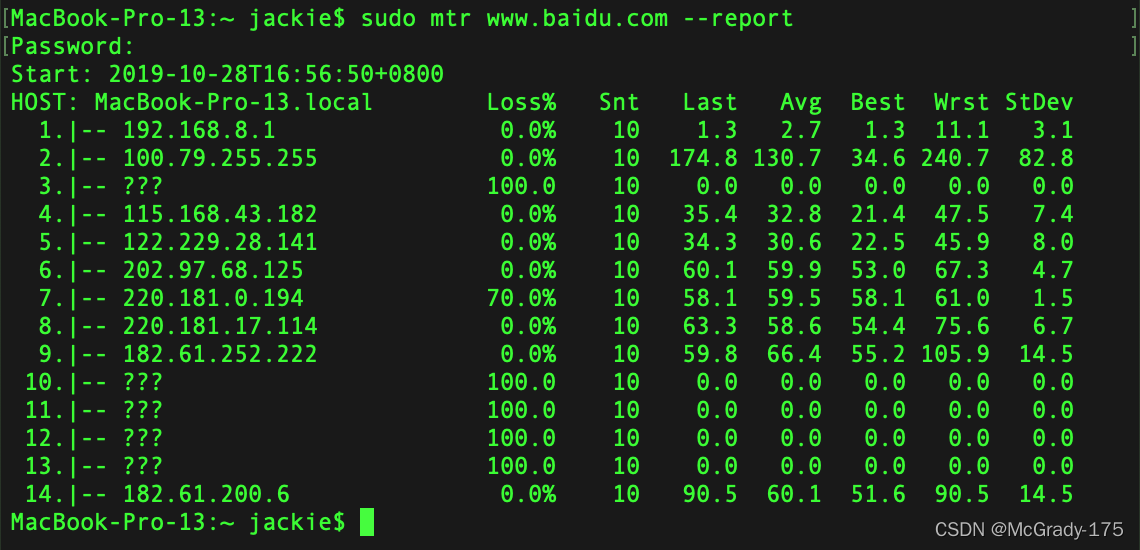本文主要是介绍MTR 命令使用详解,希望对大家解决编程问题提供一定的参考价值,需要的开发者们随着小编来一起学习吧!
MTR 是一款强大的网络诊断工具,它集成了 traceroute 和 ping 的功能,并且会收集更多的信息,比如连接状态、可用性等等,在排查网络问题中,非常有用。
MTR的安装
在 Linux 下可以直接使用 yum 工具(以 CentOS 为例)进行安装
yum install mtr在 Windows 下,建议安装 besttrace ,这款工具带了 MTR 的功能。
在 macOS 下,建议使用 brew 进行安装。
1、安装 brew
/usr/bin/ruby -e "$(curl -fsSL https://raw.githubusercontent.com/Homebrew/install/master/install)"2、安装 MTR
brew install mtr3、把程序文件复制到 /usr/local/bin 目录下
cd /usr/local/Cellar/mtr/0.92/sbin
cp mtr /usr/local/bin/
cp mtr-packet /usr/local/bin/4、运行 MTR 需要管理员权限,所以在运行的时候会提示输入密码
sudo mtr www.baidu.com理解 MTR 报告

第一列:HOST,显示IP地址或者主机名。
第二列:Loss%,这个结点的丢包率。
第三列:Snt,发送包的数量。
第四列:Last,最近一次的延时,单位是毫秒ms。
第五列:Avg,平均延时,单位是毫秒ms。
第六列:Best,最低延时,单位是毫秒ms。
第七列:Wrst,最高延时,单位是毫秒ms。
第八列:StDev,标准偏差。
MTR 报告,我们一般看两样东西:丢包率和延迟。从上图中可以看到,有很多跳显示为 ??? (超时),并且丢包率为100%。这可能是家用路由器或者运营商的路由器没有正确配置导致的,但是数据还是正常传递的,看最后跳,丢包率为 0%,说明数据包全部到达目标主机。
导致丢包率主要有三个原因:
1、运营商限制 ICMP 速率。一些运营商会设置优先级,ICMP 包的优先级比较低,可能会被小部分丢弃。
2、ICMP 包在返回过程中出现丢包。数据包正常到达目的地,由于走不同的返程路由,在返回过程中出现丢包。因此,在遇到问题时,最好在两个方向收集 MTR 报告。
3、其他的网络故障。
MTR 参数详解
用法:mtr [参数] hostname
-F, --filename FILE read hostname(s) from a file-4 use IPv4 only-6 use IPv6 only-u, --udp use UDP instead of ICMP echo-T, --tcp use TCP instead of ICMP echo-a, --address ADDRESS bind the outgoing socket to ADDRESS-f, --first-ttl NUMBER set what TTL to start-m, --max-ttl NUMBER maximum number of hops-U, --max-unknown NUMBER maximum unknown host-P, --port PORT target port number for TCP, SCTP, or UDP-L, --localport LOCALPORT source port number for UDP-s, --psize PACKETSIZE set the packet size used for probing-B, --bitpattern NUMBER set bit pattern to use in payload-i, --interval SECONDS ICMP echo request interval-G, --gracetime SECONDS number of seconds to wait for responses-Q, --tos NUMBER type of service field in IP header-e, --mpls display information from ICMP extensions-Z, --timeout SECONDS seconds to keep probe sockets open-r, --report output using report mode-w, --report-wide output wide report-c, --report-cycles COUNT set the number of pings sent-j, --json output json-x, --xml output xml-C, --csv output comma separated values-l, --raw output raw format-p, --split split output-t, --curses use curses terminal interface--displaymode MODE select initial display mode-n, --no-dns do not resove host names-b, --show-ips show IP numbers and host names-o, --order FIELDS select output fields-y, --ipinfo NUMBER select IP information in output-z, --aslookup display AS number-h, --help display this help and exit-v, --version output version information and exit这篇关于MTR 命令使用详解的文章就介绍到这儿,希望我们推荐的文章对编程师们有所帮助!





